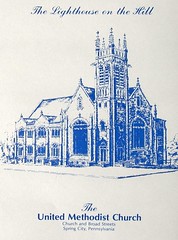AIM for Evangelism
February 8, 2009
Fifth Sunday after the Epiphany
1 Corinthians 9:16-23 and Mark 1:29-39
Jesus said, “Let us go on to the neighboring towns, so that I may proclaim the message there also; for that is what I came out to do.” – Mark 1:38
My sermon outline:
• Without vision, the people perish, so the saying goes (not exactly Proverbs 29:18, but true enough)
This Tuesday Larry King will interview Capn Chesley Sullenberger, who splashed into fame on 1/15/09 when he and the crew of USAirways flight 1549 successfully ditched in the Hudson river six minutes after takeoff from LaGuardia (birdstrike). Amazingly Capn Sully had the vision of bringing the aircraft down safely... he AIMed for salvation and achieved it, saving the lives of the 155 on board.
• 220 years ago William Carey AIMed to spread the gospel among “the heathen” that is to take the message of salvation in Christ to the subcontinent of India.
As Jesus in our reading from Mark, he saw that his mission was to proclaim the message beyond the walls of his own home. Wm Carey then spent the next 41 years -- more than half of his life -- in India.
As Paul in our reading from 1 Cor sought to relate to people so that he might bring them to salvation, Wm Carey got to know the people...
• published 1st newspaper in India
• founded over 100 schools (think about that alone!)
• wrote dictionaries and grammars of 5 Indian languages
• completely translated the Bible into 6 languages (parts into 29 more)
• through his witness the burning of widows was outlawed
• Paul talks a little bit about how and why he did the things he did, spreading the gospel. Lemme give you a little acronym for what he did:
First off he acknowledged that not only did he not make up the gospel, it wasn’t his idea to spread it... he is commissioned, he is sent... the word for that is APOSTLE. He is a witness of the risen Christ, apostolically sent by God to the nations.
Second, Paul imitated Christ in Jesus’ INCARNATION. Jesus Christ (who was fully God) put on flesh and lived among us. Paul sought to relate to the Jews on their terms, speaking their language as it were, following their customs (not difficult since he was indeed Jewish) in order that he might reach some of them with the good news of forgiveness of sins in Jesus. Paul sought to relate to the gentiles – those outside the faith – on their terms, speaking their language, following their customs, in order that he might reach some of them with the good news of fullness of life in Jesus. Like Christ, he put aside pride and station, seeking to relate to as many as possible, in order to save as many as possible.
Finally, Paul bore a message... he was on a MISSION, taking as his own commission the words of the prophet Isaiah: “I have made you alight for the Gentiles, that you may bring salvation to the ends of the earth.” (Is. 49:6)
Paul AIMed to reach people for Christ.
• So once again we as a congregation have a need to examine what we’re AIMing at... Like Jesus, we know it involves going into the surrounding area, & like Paul we know it involves relating to people where they are, so that we may best bear to them the gospel of salvation...
It may be through children’s ministry or even VBS, it may be through a new worship service, it may be through some kind of local mission. Over the next weeks and months lets sit down at the table together, pray, put our ideas out there, pray some more. I suggest we start Wed 630 outside the church office...
• No matter what direction we end up AIMing, in the end we must always be about introduce folk to Jesus, who touches us and makes us whole.
• Hymn 367 He Touched Me
- Pastor Kerry
This Sunday: 73 in worship. Beautiful weather
Expect great things from God.
Attempt great things for God.
- William Carey, 1792
Historical note: Tomorrow (February 9, 2009) marks the 300th anniversary of the fire at the Epworth parsonage. 5 year old John Wesley was dramatically rescued out of the burning building, "pluck'd like a brand." The saving experience was formative in his life.

